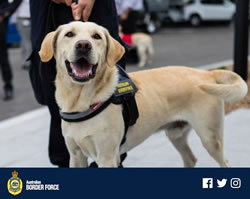 The Australian Border Force (ABF) has partnered with the Department of Agriculture, Water and the Environment (DAWE), the University of Adelaide and the South Australian Metropolitan Fire Service (SAMFS) to determine the feasibility of training COVID-19 detector dogs.
The Australian Border Force (ABF) has partnered with the Department of Agriculture, Water and the Environment (DAWE), the University of Adelaide and the South Australian Metropolitan Fire Service (SAMFS) to determine the feasibility of training COVID-19 detector dogs.
The ABF said 14 dogs had already begun their training at its National Detector Dog Program Facility in Victoria.
“COVID-19 detector dogs could potentially provide an efficient, reliable and complementary screening method as part of a future suite of biosecurity strategies in Australia,” the ABF said.
Lecturer at the School of Animal and Veterinary Sciences at the University of Adelaide, Anne-Lise Chaber said previous studies had shown dogs could detect odours, known as Volatile Organic Compounds (VOCs) that were produced by the human body’s response to viral infections.
Dr Chaber said the training would test the accuracy of the dogs in detecting VOCs in the sweat samples of people who were infected by COVID-19.
Acting First Assistant Secretary, Biosecurity Operations at DAWE, Lee Cale said it was great for the best noses in biosecurity to be involved in the project.
“Our biosecurity detector dogs are a vital part of Australia’s frontline defence against biosecurity pests and diseases and we are continually looking at new, innovative ways to utilise their skills,” Ms Cale said.
“Training detector dogs to undertake these different tasks demonstrates their versatility, but it is also a credit to the researchers and their partner agencies in recognising the potential opportunities,” she said.










